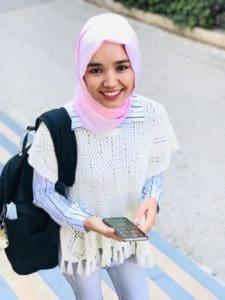Afghani Youth Activism. Member Spotlight: Safia Salar
Safia Salar is an Afghan student at the American University of Beirut in Beirut, Lebanon. She has organized youth-focused activist movements and seminars in Afghanistan, and is passionate about empowering young people. She hopes to help her family, who are stuck in Afghanistan.
Youth Activism

Safia is originally from Kabul, Afghanistan, where she graduated from high school in 2018. During her time in school, she always held a job. Since she was six years old, Safia worked, largely doing manual labor, to support her family. From a young age, she learned the English language and computer skills in school, which she feels gave her a good foundation of skills for her future. In 2019, she joined a campaign of young people against noise pollution, which was an issue she had long been concerned with. Around this time, she also began organizing seminars for Kabul youth. These seminars focused on topics like leadership skills, female empowerment, youth empowerment, peacebuilding, and self-discovery, each of which lasted five days. In addition, she worked with the United States-based non-governmental organization Be the Change in organizing the seminars. In 2019, furthermore, Safia was applying for scholarships in order to attend university. She explains that this was a difficult process, and that she was passed over for one of the scholarships she most wanted. Ultimately, she was granted a scholarship to the American University in Beirut, where she now studies. This was a great achievement, she explains, as it was not an easy feat. She hopes “it’s a marker of bigger things in the future.”
Hometown Tragedy
Safia explains that it was difficult being an Afghan student at the American University in Beirut at the beginning of her time there, as there was and continues to be a stigma surrounding Afghanistan. She says that she was sometimes afraid to introduce herself as an Afghan in Beirut, because “when we were saying we were from Afghanistan the most words we were hearing were ‘Taliban,’ ‘terrorists,’ ‘war,’ ‘fighting,’ ‘violence.’” As difficult as this was, the discrimination Safia faced in Beirut was soon overshadowed. In August 2021, Kabul was taken over by the Taliban following the withdrawal of American troops from Afghanistan. The subsequent fall of Afghanistan as a whole has had a significant impact on Safia, whose family remains in Kabul. Because of the collapse of Afghanistan, she had to change her major to psychology from political science, which she had originally hoped to study in university. The violence her family is living through put her life in Beirut in perspective for Safia, who feels helpless to save her family. Her siblings are no longer able to go to school, making Safia even more grateful for her opportunities in Beirut. This, she says, is now her biggest challenge, one she has to face daily.
MBBI
In 2019, Safia was introduced to MBBI by an advisor that was helping her with her scholarship applications. Today, Safia appreciates the work MBBI does, recognizing that they work to save victims of conflict like her family. She is also passionate about issues like climate change, which MBBI also works to address and combat. She also looks up to other members who are involved in constructive mediation around the world. “Getting membership at MBBI is a big honor for me, because there are many, many successful people who have a lot of experiences in different countries. When I’ve joined the meetings in the past I have really enjoyed the meetings and hearing what people are doing.”
Article by Tess Hargarten, MBBI Writer
